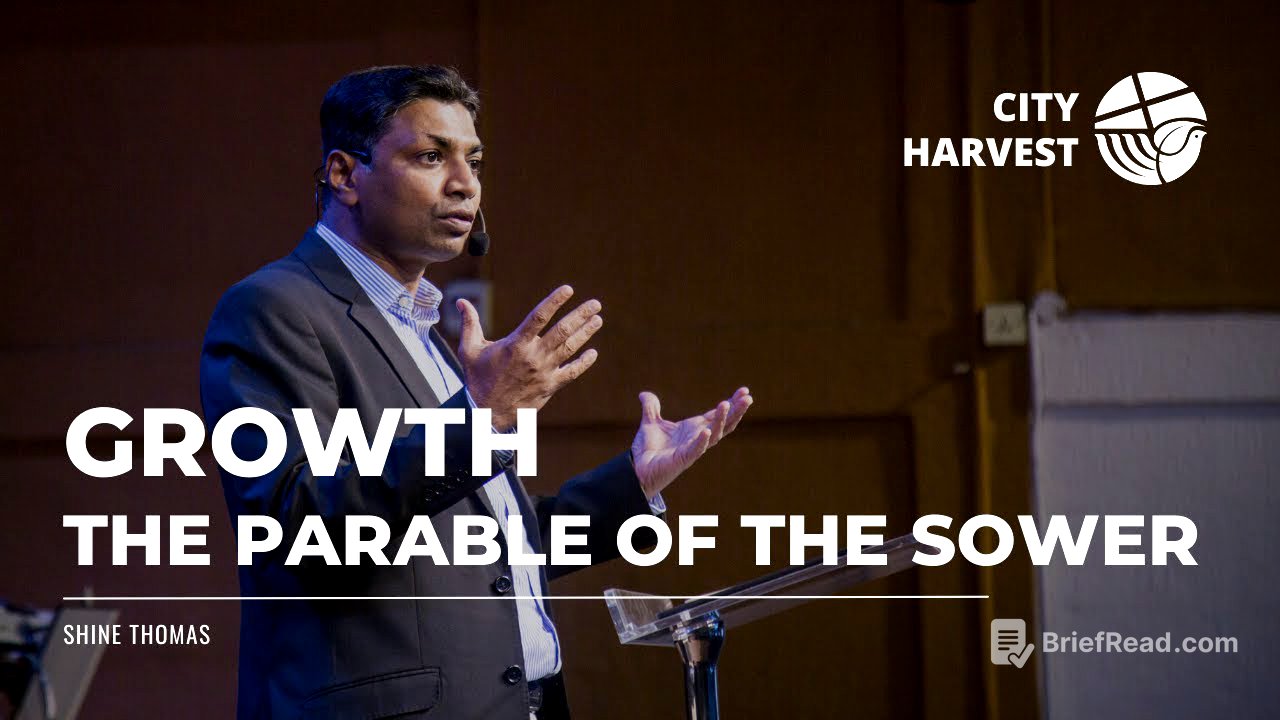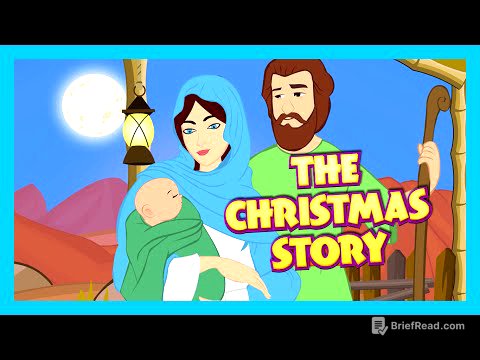TLDR;
This sermon focuses on understanding how to grow in faith by examining the Parable of the Sower from Matthew 13:1-23. It highlights the importance of remaining in Christ, asking questions, and cultivating a receptive heart to truly understand and act upon God's word. The message identifies four types of hearts (unreceptive, non-productive, destructive and good) and encourages listeners to strive for a "good soil" heart that hears, understands, and produces fruit for the Kingdom of God.
- Growth happens when you remain in Christ even when the crowd leaves.
- Understanding God's word requires abiding in it and allowing the Spirit to guide you.
- The parable illustrates different heart conditions and their impact on receiving and acting on God's word.
Introduction: The Desire for Growth [0:22]
The sermon begins by acknowledging everyone's desire to grow spiritually, similar to how we seek growth in our careers or knowledge. The core question addressed is how spiritual growth happens and what steps are necessary to grow in Christ. The speaker directs the congregation to Matthew 13:1-23, which contains the Parable of the Sower, to explore this concept.
The Scene and the Significance of Remaining [1:02]
The speaker describes the scene where Jesus teaches a large crowd by the lake, using a boat to address them. After the crowd disperses, the disciples approach Jesus with questions. This sets the stage for a key point: true growth happens when one remains in Christ even after the initial excitement of the crowd fades. Remaining and asking questions allows for a deeper understanding of the Kingdom's secrets, which are not revealed to the casual listener.
Parables: Understanding the Kingdom's Secrets [1:56]
The disciples ask Jesus why he speaks in parables. Jesus explains that the knowledge of the Kingdom of Heaven is given to those who remain with him and seek understanding. Those who have a thirst to know more will be given more, while those who do not will lose what they have. Jesus quotes Isaiah to describe the crowd who hears but does not understand, contrasting them with the disciples whose eyes and ears are blessed because they perceive the truth.
The Purpose and Interpretation of Parables [7:00]
The speaker explains that Jesus doesn't immediately explain the parable but speaks further, testing the disciples' commitment to remaining and understanding. This illustrates that understanding comes with abiding in Christ and trusting in Him. The speaker defines a parable as a comparison of two subjects for teaching purposes, moving from the known to the unknown, using everyday stories with spiritual meanings. He cautions against allegorizing parables by finding multiple meanings in every detail, emphasizing that each parable typically has one core message.
The Elements of the Parable of the Sower [14:37]
The speaker breaks down the parable into its main elements: the soil (human heart), the seed (word of God), and the sower (Jesus). He identifies four types of soil: compacted soil (pathway), rocky soil, soil in thorn bushes, and good, prepared soil. The speaker emphasizes that even unfavorable soil conditions can be improved, and the heart can be prepared to receive the word of God.
The Unreceptive Heart: The Hardened Path [17:56]
The first heart condition is the unreceptive heart, represented by the seed that falls on the path. This refers to those who hear the message but do not understand it, and the evil one snatches it away. This type of heart is characterized by selective hearing, where individuals only want to hear certain messages (like prosperity and blessings) and ignore others (like repentance and sin). It also involves selective obedience, where people obey some commands but neglect others.
The Non-Productive Heart: Rocky Ground [21:41]
The second heart condition is the non-productive heart, represented by the seed falling on rocky ground. These individuals receive the word with joy but have no root, so they quickly fall away when trouble or persecution comes. They show initial enthusiasm but lack continuity in their faith. They may engage in morning devotions but switch off their "Christian mode" when they enter the world, behaving no differently from non-believers.
The Destructive Heart: Among Thorns [24:13]
The third heart condition is the destructive heart, represented by the seed falling among thorns. These individuals hear the word, but the worries of life and the deceitfulness of wealth choke it, making it unfruitful. This represents a divided heart where one is a church member but also a slave to money, prestige, and worldly values.
The Good Soil: A Receptive and Understanding Heart [26:43]
The fourth heart condition is the good soil, which represents someone who hears the word and understands it. This person not only hears but also spends time reading and studying the word, seeking to understand it deeply. Like the disciples, they ask questions and abide with Christ. This leads to a productive life, useful for the Kingdom of God. The speaker shares a personal anecdote about spending time worshiping and studying God's word in his youth, which paid off later in life.
Commitment to Growth and Self-Examination [30:15]
The speaker urges listeners to commit to growth in the Kingdom of God, which lasts forever, unlike the fleeting kingdom of this world. He prompts self-examination, asking whether their heart is hard like a pathway, rocky, or filled with thorns. He emphasizes that preparing the soil of the heart is painful but necessary for growth, requiring denying oneself, following Jesus daily, and abiding in Christ.









